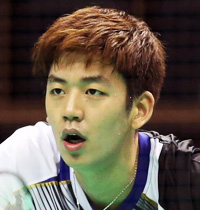- California Assembly OKs highest minimum wage in nation
- S. Korea unveils first graphic cigarette warnings
- US joins with South Korea, Japan in bid to deter North Korea
- LPGA golfer Chun In-gee finally back in action
- S. Korea won’t be top seed in final World Cup qualification round
- US men’s soccer misses 2nd straight Olympics
- US back on track in qualifying with 4-0 win over Guatemala
- High-intensity workout injuries spawn cottage industry
- CDC expands range of Zika mosquitoes into parts of Northeast
- Who knew? ‘The Walking Dead’ is helping families connect
Olympic badminton champ gets banned for missing drug tests
By Jung Min-ho
Beijing Olympic badminton gold medalist Lee Yong-dae was banned from competing in September’s Incheon Asian Games after missing required doping tests, the Badminton World Federation (BWF) said Tuesday.
Lee’s mixed doubles partner Kim Ki-jung was also banned for the same reason. The two plan to appeal the decision. The Badminton Association of Korea (BKA) called a news conference to explain the ban was based not on the result of tests, taking responsibility for its failure to have them undergo tests at BWF-designated times.
“Korean badminton players, Kim Ki-jung and Lee Yong-dae, each received a one-year ban for violating the requirements related to filing information on their whereabouts and the resultant missed tests under the BWF Anti-Doping Regulations,” the BWF announced on its homepage.
“Their period of ineligibility is from Jan. 24 2014 to midnight on Jan. 23 2015, during which time the players cannot participate in any capacity in a competition or activity.”
As part of the BWF’s Registered Testing Pool of International Level Badminton Athletes, Kim and Lee were required to provide information on their whereabouts for the conducting of out-of-competition testing, but they failed to do so, the BWF noted.
“In 2013, both athletes accumulated three whereabouts failures in connection with this administrative process. The Koreans appeared before a three-member BWF Doping Hearing Panel on Monday 13 January, 2014, to answer these charges,” the BWF said.
The penalty was reduced from the normal two-year ban because the BWF decided the BKA was also responsible for failing in its duty to keep the BWF informed of the players’ whereabouts on their behalf.
The panel recommended that the BWF fine the BKA for “such a lack of diligent effort.” Disciplinary sanction against the BKA will be decided later.
The BKA held a press conference Tuesday and said it will appeal the decision, noting the players neither took any illegal drugs nor intentionally avoided the tests.
“It inevitably happened because of scheduling issues,” a BKA official told reporters. “We will try our best to enable them to participate in the upcoming Asian Games.”
According to the BWF Anti-Doping Regulations, athletes have the right to appeal to the Court of Arbitration for Sport in Switzerland. It has to be done by Feb. 17 for any chance of a reversal.
“Nonetheless, we deeply regret failing our athletes. We are very sorry to anyone concerned with the issue,” the BKA official said.
Lee and his former partner Lee Hyo-jung became the youngest gold medalists in Olympic badminton by winning a gold medal in the mixed doubles in Beijing, making the former one of the nation’s transcendent sports stars. Lee, partnered with Jung Jae-sung, added a bronze medal to his tally in the men’s doubles at the 2012 London Games.













